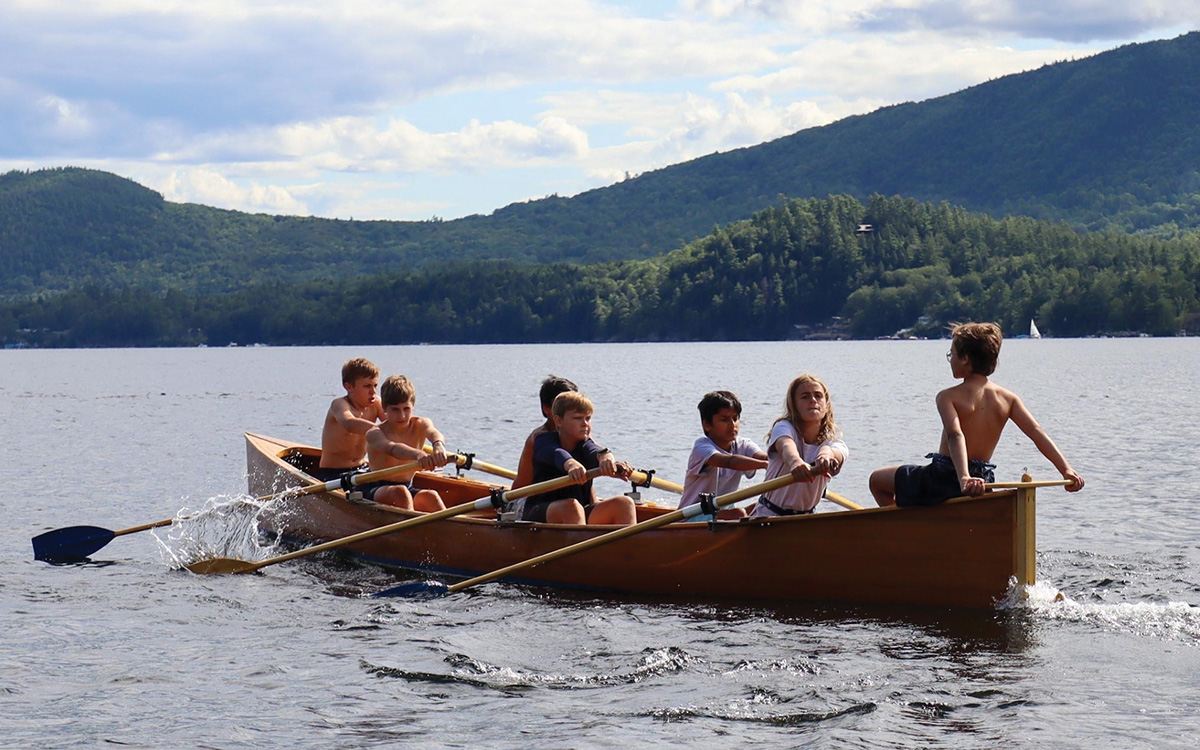Traditions and Community: Summer Camp for FS Kids
A Foreign Service spouse shares all the reasons she sends her kids to summer camp in the U.S. every year.
BY JESSICA POWLEY HAYDEN

Campers row across Newfound Lake in August 2023.
Courtesy of Jessica Powley Hayden
A pack of shirtless boys emerges from the woods, carrying banners and chanting. Some are painted head to toe in blue, others in red. The older boys, decked out in blue, start a call-and-response while the younger boys follow along. From out of a pine grove, campers are shouting so loudly, you can hear their voices start to crack:
Down by the river
Had a little walk
Met up with Red Crew
Had a little talk
Pushed him in the river
Hung him up to dry
We can beat Red Crew
Any old time!
It’s Crew Day at Camp Mowglis, one of the oldest boys’ sleepaway camps in the United States. Started in 1903 on the banks of Newfound Lake in New Hampshire, Camp Mowglis is steeped in tradition. The camp was founded with the aim to teach young men the lessons Mowgli himself learned being raised by wolves in the jungle in Rudyard Kipling’s classic, The Jungle Book.
For more than 100 years, the typical day at camp hasn’t much changed. Boys wake up to the sound of a bugle and participate in colors, raising and lowering the American flag every day. Campers have daily chores, learn to use an axe and shoot a rifle, and take part in challenges like across-the-lake swims. The kids also row, sail, hike, and climb. Most importantly, they learn to rely on themselves and their fellow campers. Life at camp is basic, simple, and blessedly tech-free. Traditions are passed down from one generation to the next.
Every summer for the last five years, our family has gathered at this camp to take part in Crew Day activities, one of the biggest events and camp traditions. The campers are split into one of two teams, Red or Blue. Alumni campers return to the shores of Newfound Lake to cheer on the new generation of rowers. Younger boys take part in the morning races, but the big race is the last of the day, when the oldest boys face off. The atmosphere is electric: It’s the Super Bowl, World Cup, and Olympics of camp life.
Their lives are rich with other experiences that have molded them and made them, I’d argue, incredibly interesting people.
This year, our oldest son, Alex, has made Blue Racing Crew. He’s worked toward this goal since he was a 9-year-old cub. From the shoreline, I spot him on the dock with his crewmates, chanting and yelling and cheering for the younger Blue rowers. Finally, it’s his turn. The racing crew boats take off, and the crowds raise their voices in support. The Red Crew has a drum they beat from the shoreline, and Blue a pair of cymbals.
The boys work together to propel their boats across the lake. Blue seems to be out front, but soon Red overtakes them and crosses the finish line, victorious. My son comes out of the boathouse, and while parents and campers encouragingly pat his back, his face has fallen.
But the loss is just one more part of the camp lesson and tradition. The Red Crew and Blue Crew will meet back in the center of camp, arms draped from camper to camper. As tradition holds, they raise the oar of the winning team up the flagpole. And they will sing about coming back together as one team, brothers and campers, linked together not just now but for the rest of their lives.
There are many ordinary American traditions my Foreign Service kids will never experience. They haven’t always celebrated holidays in the same place or been in the same school for yearly milestones like an elementary promotion or field day. We don’t go to the same small-town Fourth of July parade every year.
Yes, their lives are rich with other experiences that have molded them and made them, I’d argue, incredibly interesting people.
And while they’ve had countless Instagrammable moments in locations from Athens to Reykjavík, this lifestyle comes with a cost, often in the form of consistency, stability, and traditions. Throughout all our moves, our evacuation from Ukraine, and the COVID-19 pandemic, one tradition for our kids has stayed constant: summer camp.
Life at camp is basic, simple, and blessedly tech-free. Traditions are passed down from one generation to the next.
Many friends have asked how we can send our kids away for so long in the summer. It’s not cheap. It means my summer trips to the U.S. involve driving thousands of miles up and down the East Coast. And yes, it means we’ve missed out on taking some summer family vacations. But what we get in return has been magical.
Our kids have a community—a camp home—to which they will return for the rest of their lives. It is a spot on the map that is theirs and theirs alone. They have learned skills that we simply could not teach them on our own. (My daughter has learned to water ski—one sport that I swore off after a particularly bad day in the lake as a teen.)
Camp has provided a sacred bubble for them to be children, completely divorced from the athletic and academic pressures that infiltrate most adolescent extracurriculars.
And there is really nothing better than seeing them, so dirty and smelly, running up to embrace you on the last day of camp. A little taller. A little tanner. A little more confident. And, certainly, a lot more independent.
When sharing or linking to FSJ articles online, which we welcome and encourage, please be sure to cite the magazine (The Foreign Service Journal) and the month and year of publication. Please check the permissions page for further details.




